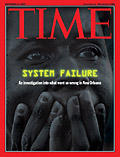Bob Herbert's opinion piece
A Rush of Stories. It begins, "I was in the attic for four days, with no food, water, nothing. Just roaches crawling all over me. And I seen a rat, too. I had to use a board to hold my head above the water, 'cause it was up to my neck. So help me, I thought I was going to die." ...
UPDATE: I'M POSTING THE ENTIRE ARTICLE:
By BOB HERBERT (NYT) 839 words
Published: September 12, 2005
''I was in the attic for four days, with no food, water, nothing. Just roaches crawling all over me. And I seen a rat, too. I had to use a board to hold my head above the water, 'cause it was up to my neck. So help me, I thought I was going to die.''
-- Bernice Jones, 64, who finally managed to pry her way out of the attic and was taken by boat to the Superdome.
''They wanted to take my grandmother to Iowa. She's 90 years old and has Alzheimer's. What was she gonna do in Iowa?''
-- Donald McCray, 52, who is looking after his grandmother, Susie Hudson, in a shelter in Gonzales, La.
''A huge percentage of the people who were left behind didn't have a way out. It makes me sick that our plan for them didn't work very well.''
-- Dr. Erin Brewer of Louisiana's Office of Public Health.
The stories -- freakish, tragic and sadly true -- continue to come out of New Orleans in an awful, unending rush, like blood from a sudden gaping wound. The stunned survivors have scattered to places like Houston, Dallas, Baton Rouge and here -- Lafayette -- where the Cajundome (yet another sports palace turned homeless shelter) rises like a giant mushroom from the flat, shimmeringly hot parish landscape.
JoAnn Kelly, 25, and her sister Nicole, who is 28, were sitting on a low brick ledge outside the Cajundome when I walked up. Each was holding a nervous Chihuahua. ''This is Pebbles,'' said JoAnn. ''That one's Powder. We kept them with us the whole time.''
The two women, who lived in the Magnolia projects in New Orleans, were tired but anxious to tell their story. Like so many others, they thought the worst was over when the winds from Hurricane Katrina subsided and the weather began to clear.
''The sun was out,'' said Nicole. ''But the water started coming right up the street and it kept rising. Then we heard Governor Blanco saying on the radio that they couldn't stop the water and everybody should just get out.
''So we started calling 911, but we couldn't get any help.''
The sick feeling of panic began to rise up in the residents who had stayed in the projects during the hurricane. ''There were helicopters flying by,'' JoAnn said. ''We were up on the fire escape waving white towels, pleading for somebody to help us.''
Eventually a few men from the neighborhood began showing up in stolen boats and trucks. The elderly and small children were the first to be evacuated. JoAnn, Nicole and the dogs were bundled into a milk truck crowded with people. Once again they thought the worst of their ordeal was over, and once again they were wrong.
Packed with hot and filthy evacuees (and crates of rapidly souring milk), the truck crossed a bridge from New Orleans to Jefferson Parish, where the desperate occupants were promptly and grotesquely humiliated by several heavily armed plainclothes officers.
There were dozens of men, women and children in the truck when it was stopped. They were hungry, thirsty and frightened. It should have been obvious to any sentient being that they were fleeing the flood. Nevertheless, said Nicole, they were ordered out of the truck at gunpoint, with their hands up. One young man was thrown to the ground. The others were ordered to get on the ground, face down.
The occupants of the milk truck were black, and they were in dire need of assistance. But in the midst of one of the greatest emergencies in the nation's history, the opportunity to gratuitously humiliate them proved irresistible.
''They laid us out on the ground,'' said JoAnn. Her voice quivered and tears began to leak down her face. ''I was pleading. I was saying, 'Sir, please -- -- ' And then we all went to praying. Crying and praying.'''
''We were all praying,'' said Nicole, ''because we were afraid, the way they were acting, that they would shoot us.''
Eventually, the officers let the group go. No one was charged with any crime. ''They even helped us start the milk truck,'' Nicole said. ''The last thing they told us was, 'Y'all get on out of here. And don't come back.'''
The milk truck made its way west on Route 10, and the homeless, bedraggled occupants ultimately were directed to the Cajundome, where, according to JoAnn and Nicole, the officials and volunteers couldn't have been more gracious and helpful.



